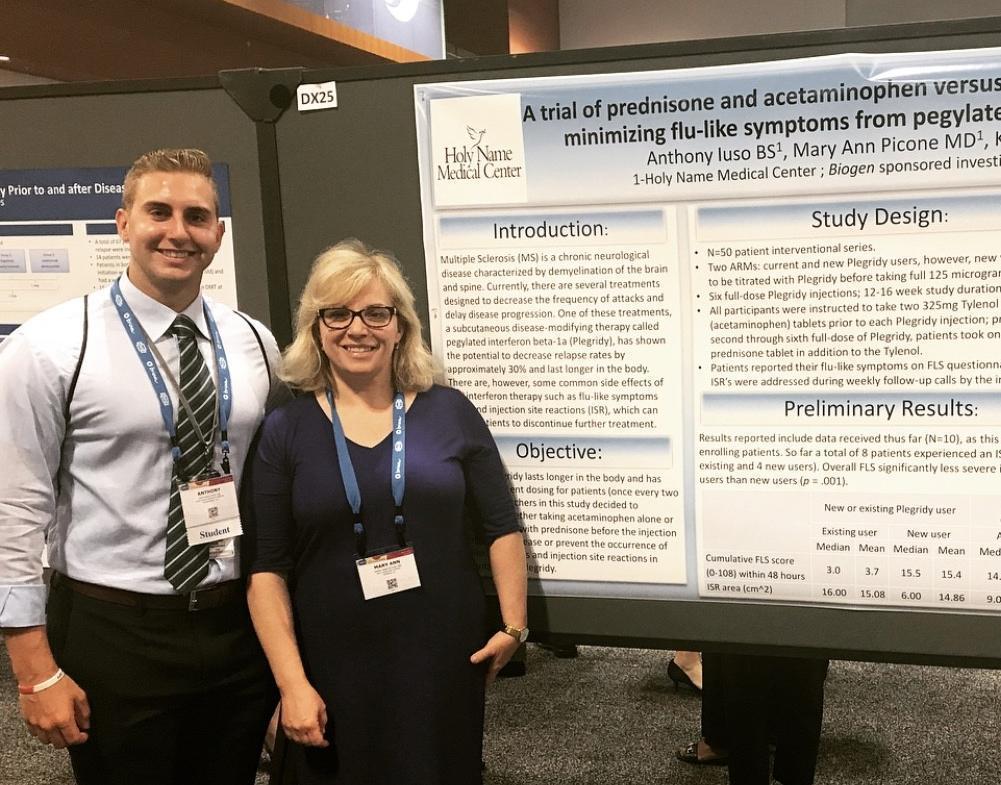Countering the Side Effects of Inteferon Drug Treatment
TouroCOM Harlem Medical Student Anthony Iuso Returns to Lab to Study How to Combat Flu-like Symptoms from Popular MS Drug

In May of 2018, months before he started his first year of medical school, TouroCOM Harlem medical student Anthony Iuso presented a research abstract at the Consortium of Multiple Sclerosis Conference in Nashville, TN.
“I presented as a student before medical school alongside the physician I shadowed,” said Iuso, who started his second year at TouroCOM Harlem in July. “It was a really unique opportunity. I was surrounded by medical school students and other physicians. It was kind of awe-inspiring.”
Under Mary Ann Picone, MD, of the Multiple Sclerosis Center at Holy Name Medical Center, Iuso studied whether acetaminophen combined with prednisone worked better than plain acetaminophen to combat the flu-like symptoms associated with a popular drug treatment for multiple sclerosis. Dr. Picone also asked Iuso to write the chapter on rheumatology in her book, “MS for the Non-Neurologist,” which was published in May 2019. This summer, with a year of medical school under his belt, Iuso returned to the lab again to further his last research project and help launch a new one.
Multiple Sclerosis causes the immune system to attack the protective sheath (myelin) that cover nerve fibers and allow the brain to communicate with the body. Eventually the disease causes permanent damage or deterioration to the nerve cells. Iuso’s study concerned the effects of Plegridy, a popular FDA-approved treatment for MS that belongs to the interferon class of drugs. Interferons are naturally occurring proteins used by cells to combat viruses and bacteria; drugs in the interferon class are man-made versions of the same proteins that then work with the immune system. Interferons were found to quiet the inflammation of spine and brain in patients suffering from MS.
“Since interferon suppresses the immune system you can get flu-like symptoms,” explained Iuso. “At our injection site, our aim was to modulate and monitor the side effects. We gave out small dosages of prednisone and Tylenol for a 6-8-week trial and we monitored those symptoms over time to see if they improved.”
“Preliminary results so far support our hypothesis that prednisone and Tylenol ameliorate the flu like symptoms and injection site reactions in MS patients on Plegridy, especially for patients that are new users of the treatment,” said Iuso.
In another study, Iuso examined the effects of a work-out regime on patients undergoing treatment for MS.
“A common side effect of MS, if it’s severe, is that you’re sitting down over time and the muscles and bone tend to break down from the sedentary lifestyle, leading to sarcopenia and osteopenia,” said Iuso. “We tried to stop the osteopenia or at least reduce it.”
Iuso provided patients with a DEXA bone scan and evaluated whether there was any improvement in the bone mineral density. The study also sought whether the treatment had an overall effect on the patients’ moods and overall quality of life. That study is still ongoing.
“Having this clinical research experience before I started medical school gave me a better understanding of how to do research and how positive research can be when it’s done correctly,” said Iuso. “Doing research after my first year of medical school allowed me to see things practically. Our first year is spent learning in the classroom, but being able to have a hands-on experience and be a part of something that can have an impact on the medical field is wonderful. I am very humbled and thankful for the opportunities Dr. Picone has provided me. I’m learning even more.”

